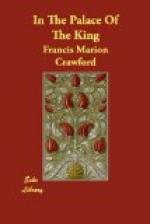Then he went away again, and softly closed the door behind him, after looking back once more to be sure that no one was there after all, and perhaps, as people sometimes do on leaving a place where they have escaped a great danger, fixing its details unconsciously in his memory, with something almost akin to gratitude, as if the lifeless things had run the risk with them and thus earned their lasting friendship. Thus every man who has been to sea knows how, when his vessel has been hove to in a storm for many hours, perhaps during more than one day, within a few miles of the same spot, the sea there grows familiar to him as a landscape to a landsman, so that when the force of the gale is broken at last and the sea subsides to a long swell, and the ship is wore to the wind and can lay her course once more, he looks astern at the grey water he has learned to know so well and feels that he should know it again if he passed that way, and he leaves it with a faint sensation of regret. So Adonis, the jester, left the King’s supper-room that night, devoutly thanking Heaven that the Emperor Maximilian had died of eating too many melons more than a hundred and fifty years ago.
Meanwhile, the King had left the Queen at the door of her apartments, and had dismissed Don John in angry silence by a gesture only, as he went on to his study. And when there, he sent away his gentlemen and bade that no one should disturb him, and that only Don Antonio Perez, the new favourite, should be admitted. The supper had scarcely lasted half an hour, and it was still early in the evening when he found himself alone and was able to reflect upon what had happened, and upon what it would be best to do to rid himself of his brother, the hero and idol of Spain.
He did not admit that Don John of Austria could be allowed to live on, unmolested, as if he had not openly refused to obey an express command and as if he were not secretly plotting to get possession of the throne. That was impossible. During more than two years, Don John’s popularity, not only with the people, but with the army, which was a much more serious matter, had been steadily growing; and with it and even faster than it, the King’s jealousy and hatred had grown also, till it had become a matter of common discussion and jest among the soldiers when their officers were out of hearing.
But though it was without real cause, it was not without apparent foundation. As Philip slowly paced the floor of his most private room, with awkward, ungainly steps, stumbling more than once against a cushion that lay before his great armchair, he saw clearly before him the whole dimensions of that power to which he had unwillingly raised his brother. The time had been short, but the means used had been great, for they had been intended to be means of destruction, and the result was tremendous when they turned against him who used them. Philip was old enough to have been Don John’s father, and he remembered how




